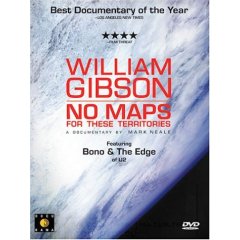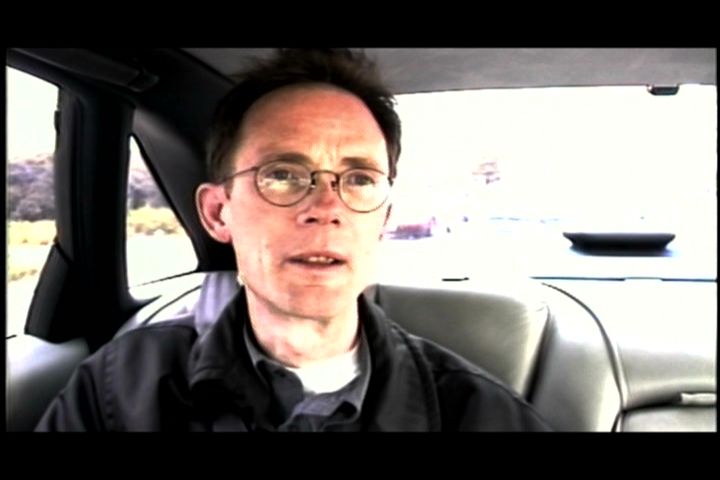Driving Mr. Gibson
 The Mark Neale idea of driving around William Gibson while he responds to interview questions resulting in William Gibson—No Maps for These Territories works for me. Mark proclaimed back in 2000 that this is the only documentary about William Gibson, the guy from Middle America who coined the term “cyberspace.”
The Mark Neale idea of driving around William Gibson while he responds to interview questions resulting in William Gibson—No Maps for These Territories works for me. Mark proclaimed back in 2000 that this is the only documentary about William Gibson, the guy from Middle America who coined the term “cyberspace.”
 What’s important for me to understand—and what this documentary shows around the 27th minute—is that it was Gibson, Bruce Sterling and others in the cyberpunk movement that made personal computers sexy, dramatic devices in fictional prose. The leap from prose to film, punctuated by the huge Matrix movies, was just a matter of time. Also the carefully crafted desire for, say, Apple computers can be traced back to the conceptual aesthetics of this movement.
What’s important for me to understand—and what this documentary shows around the 27th minute—is that it was Gibson, Bruce Sterling and others in the cyberpunk movement that made personal computers sexy, dramatic devices in fictional prose. The leap from prose to film, punctuated by the huge Matrix movies, was just a matter of time. Also the carefully crafted desire for, say, Apple computers can be traced back to the conceptual aesthetics of this movement.
Here are some other revelations in William Gibson—No Maps for These Territories:
- William Gibson refers to himself as a science fiction writer. This surprised me because of the influence of the “speculative fiction” market—characterized by such literary greats as Octavia Butler.
- William Gibson has a masterful grasp on many historical subjects—this may be unexpected from a science fiction writer. But it makes perfect sense to me.
 William Gibson takes every opportunity to degrade his freshman work, Neuromancer. He calls the book a “young man’s novel” written by someone not so old but sufficiently (and frighteningly) immature. He also suggests that many fans of Neuromancer do not like his later work and there is pressure to go back to his old “three-chord” style, abandoning the hard-won technique in his mature, more ‘symphonic’ works.
William Gibson takes every opportunity to degrade his freshman work, Neuromancer. He calls the book a “young man’s novel” written by someone not so old but sufficiently (and frighteningly) immature. He also suggests that many fans of Neuromancer do not like his later work and there is pressure to go back to his old “three-chord” style, abandoning the hard-won technique in his mature, more ‘symphonic’ works.- Bruce Sterling is amazed about how few people trapped within the context of “traditional” science fiction (of the 1980s) could not “wrap their heads around” the concept of cyberspace.
- William Gibson reminds us that he grew up in a world that taught children that the future was “planned” and “coming soon”—but everything could end in a nuclear holocaust.
- Gibson’s dim but first-hand-experienced view of “recreational” drug use resonates with my second-hand views.A wonderful comment from Gibson is an expression of his certainty that the prefix cyber- will have the same fate as the prefix electro-. It may follow that “cyberspace” may simply become “my space”—sound familiar? This allows me, a writer here in the ‘kinté space,’ to speculate that children in the future may grow up with new definition of space itself. What we now think of as ‘space’ which is ultimately related to what we now call “nature” will be totally disconnected and privatized into “the cloud” (a network of computers). The horror is that space itself becomes private property—even the subatomic particles will be marked with some barbarian seal of ownership.
